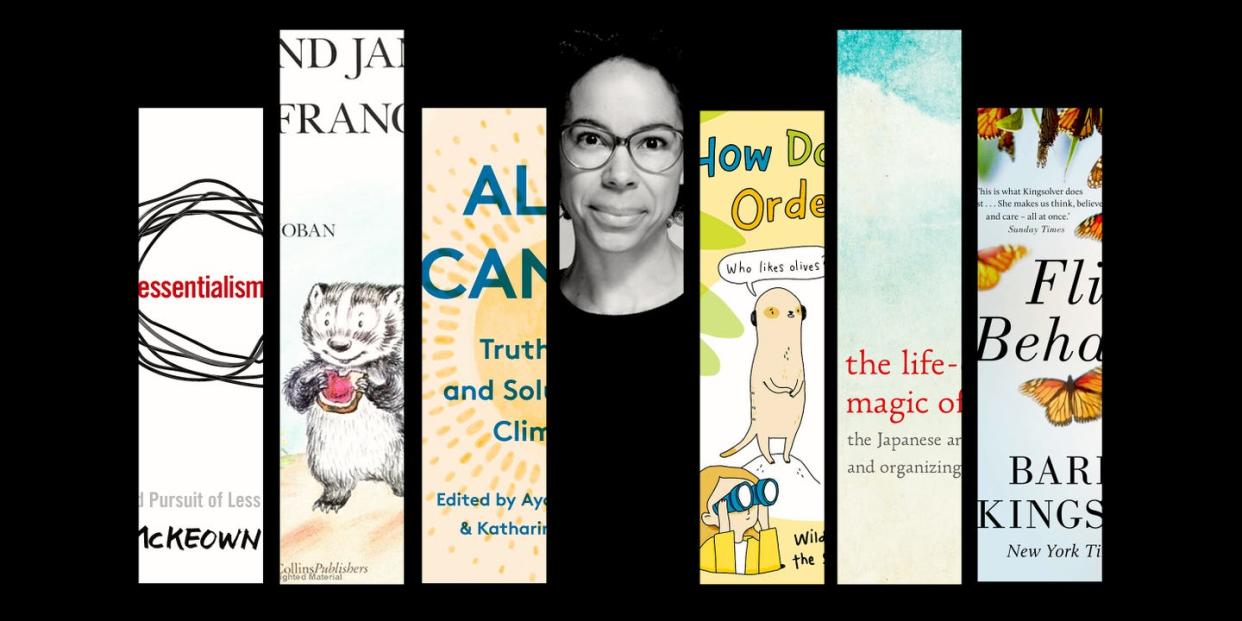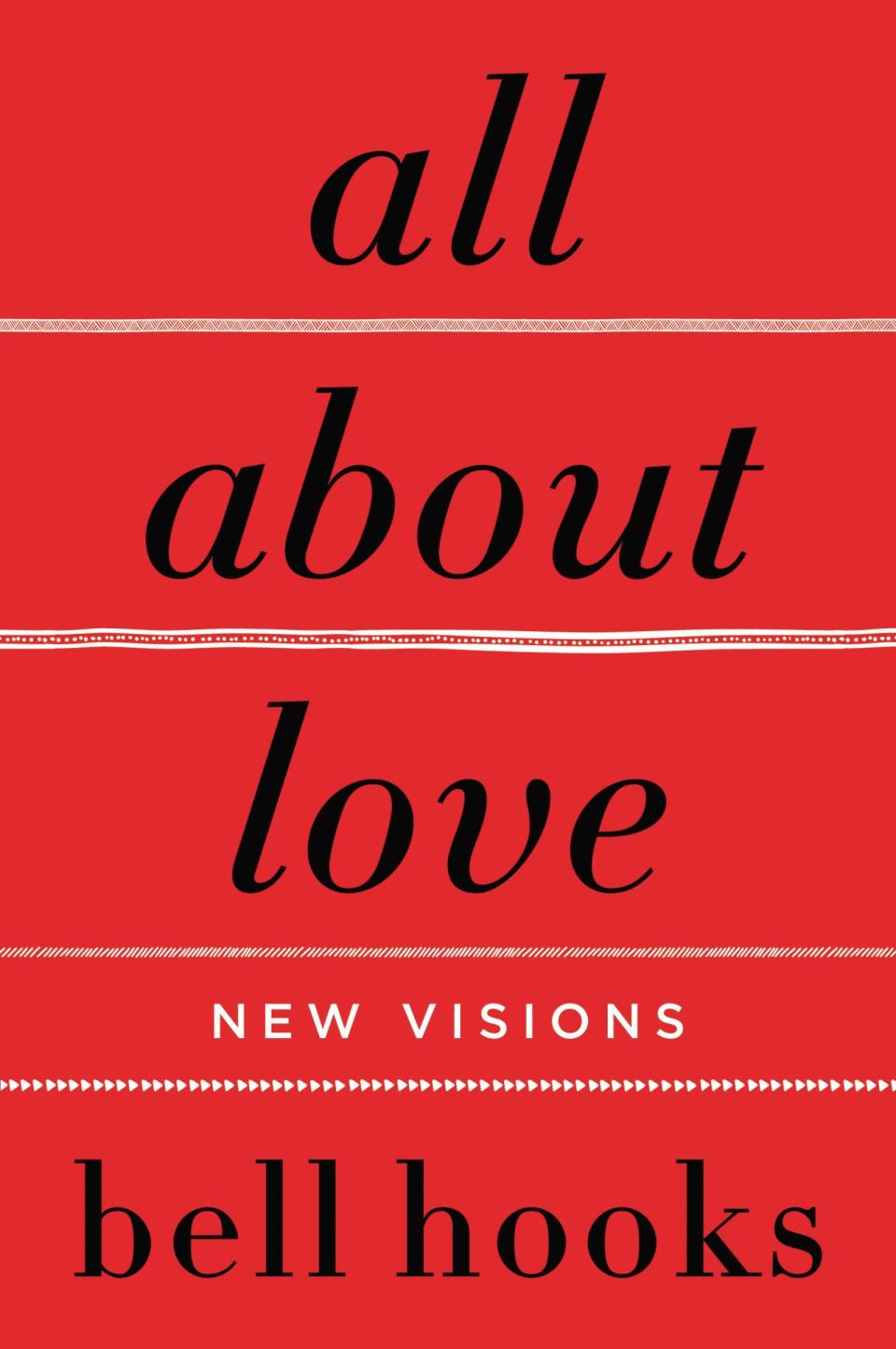Ayana Elizabeth Johnson on Marie Kondo, 'All About Love ,' and More

"Hearst Magazines and Yahoo may earn commission or revenue on some items through these links."
Welcome to Shelf Life, ELLE.com’s books column, in which authors share their most memorable reads. Whether you’re on the hunt for a book to console you, move you profoundly, or make you laugh, consider a recommendation from the writers in our series, who, like you (since you’re here), love books. Perhaps one of their favorite titles will become one of yours, too.

What If We Get It Right? by Ayana Elizabeth Johnson
penguinrandomhouse.com
$34.00
If you ever find yourself dining with Dr. Ayana Elizabeth Johnson, marine biologist, policy expert, and writer—What If We Get It Right?: Visions of Climate Futures (One World; just in time for Climate Week NYC)—please don’t order the octopus. Or shrimp.
The Brooklyn-born and -raised Explorers Club member and TED resident, who has wanted to be a marine biologist since she saw her first coral reef at 5, co-founded think tank Urban Ocean Lab, the All We Can Save Project (and co-edited the All We Can Save feminist climate anthology), and the Blue Halo Initiative, which works on ocean zoning efforts; co-created the “How to Save a Planet” podcast (almost title: Hot or Not?) and the Blue New Deal, which includes the ocean in environmental policy, in collaboration with Sen. Elizabeth Warren; helped organize the March for Science; worked at the EPA and NOAA on federal ocean policy; co-invented an award-winning fish trap; was part of “Science in Seconds” with Patagonia; was interviewed by Ilana Glazer; lives with her regenerative farmer/public school teacher mom who sold her Skyhill Farm in upstate NY (her dad was a Jamaican artist); delivered a commencement speech at Middlebury; installed a hot water heat pump to rid her home of fossil fuels; was on the Time100 Next list; once took over Julia Louis-Dreyfus’s Instagram; and holds programs at Pioneer Works.
Fan of: oceans (which capture 25% of carbon emissions and 90% of earth’s excess heat); offshore wind energy; design magazine Deem Journal (she was on its cover); Roman’s restaurant in Brooklyn
Not so much: When people ask for a “quick and easy” thing to do to help the planet (no such thing); dairy (she’s allergic).
Life lesson: Don’t work with jerks.
Motivation: Creating the best possible climate future.
Good at: Practicality; drinking beer with fishermen in the Caribbean (she interviewed hundreds of them for her PhD on sustainable fishing at the University of California in San Diego). Tap her book recs below for your TBR pile.
The book that:
...shaped my worldview:
How We Show Up by Mia Birdsong. Mia’s book helped me rethink how I approach and value my friendships and how I want to live within a community.
…describes a place I’d want to visit:
Jayber Crow by Wendell Berry. A vivid depiction of communal, agrarian, small town life that is mostly lost and is critical to revive—in a new incarnation.
…currently sits on my nightstand:
The Future of the Responsible Company: What We’ve Learned from Patagonia’s First 50 years by Vincent Stanley with Yvon Chouinard. Corporations must be part of addressing our intertwined environment, democracy, and inequality crises, so I’m interested in lessons from those trying to get this right. (Note: I serve on Patagonia’s board of directors, so this is overdue homework!)
…helped me through a breakup:
The Life-Changing Magic of Tidying Up by Marie Kondo. When my heart was shattered, a friend recommended this book along with the advice to just blindly follow its directions. I did, and it was such a balm to deliberately recalibrate my relationship with my belongings while suddenly having to make a new home—and I still fold my underwear she suggests!
…I’d pass on to a kid:
How Do Meerkats Order Pizza? by Brooke Barker. I have a stack of these to give to kids as gifts. It’s hilarious, full of fascinating animal facts, and super fun to read aloud.
…should be on every college syllabus:
All We Can Save: Truth, Courage, and Solutions for the Climate Crisis edited by me and Katharine K. Wilkinson. Obviously I’m biased here, but this anthology, brimming with wisdom from women climate leaders, has already been taught in over 100 colleges, helping students navigate this wild time in Earth and human history.
...I brought on my PhD field research trip:
Reef Fish Identification: Florida Caribbean Bahamas by Paul Humann and Ned Deloach. I spent so many hours in Cura?ao flipping through these pages studying the photos and life histories and Latin names of Caribbean fish species. Yes, I have a major soft spot for a fish ID book.
...I consider literary comfort food:
Bread and Jam for Frances by Russell Hoban with pictures by Lillian Hoban. All the Frances stories, really. They were my favorite books (and books on tape) as a child, and I still have many pages of them committed to memory.
...made me rethink a long-held belief:
Essentialism: The Disciplined Pursuit of Less by Greg McKeown. I think about the concept “less is more” often, usually when reacting to rampant consumerism, aspiring to minimalism, or appreciating good design. This book helped me understand how it can also be a valuable concept for my professional life, thinking how to make the most impact with the minutes and resources I have by focusing on what matters most.
…I would have blurbed if asked:
The Ocean’s Whistleblower: The Remarkable Life and Work of Daniel Pauly by David Grémillet. Well, I was asked to blurb it, enthusiastically said yes, then… proceeded to miss the deadline. So here’s the blurb that didn’t make the book jacket: “Intrigue, danger, foes, failure, fish, politics, victory, and love. A truly remarkable life story of a scientist’s singular devotion to end overfishing and care for coastal communities. I have long considered Dr. Pauly a hero, and now, thanks to Grémillet’s deeply compelling biography, we can see just how he transformed his field and created a gargantuan legacy, against long odds.”
…I recommend over and over again:
Flight Behavior by Barabra Kingsolver. A gorgeously written novel about (among other things) butterflies, climate, purpose, and love. I read it with my mom in our two-person book club, and it sparked many sparkling conversations.
...has the best opening line:
All About Love by bell hooks. “When I was a child, it was clear to me that life was not worth living if we did not know love.” On love as a verb, as a society-shaping force far beyond the romantic.
How We Show Up by Mia Birdsong

How We Show Up by Mia Birdsong
amazon.com
$11.99
Jayber Crow by Wendell Berry

Jayber Crow by Wendell Berry
amazon.com
$12.38
The Future of the Responsible Company by Vincent Stanley with Yvon Chouinard

The Future of the Responsible Company by Vincent Stanley with Yvon Chouinard
amazon.com
$18.60
The Life-Changing Magic of Tidying Up by Marie Kondo

The Life-Changing Magic of Tidying Up by Marie Kondo
amazon.com
$9.99
How Do Meerkats Order Pizza? by Brooke Barker

How Do Meerkats Order Pizza? by Brooke Barker
amazon.com
$14.92
All We Can Save by Ayana Elizabeth Johnson and Katharine K. Wilkinson

All We Can Save by Ayana Elizabeth Johnson and Katharine K. Wilkinson
amazon.com
$12.61
Reef Fish Identification by Paul Humann and Ned Deloach

Reef Fish Identification by Paul Humann and Ned Deloach
amazon.com
$30.49
Bread and Jam for Frances by Russell Hoban

Bread and Jam for Frances by Russell Hoban
amazon.com
$11.56
Essentialism by Greg McKeown

Essentialism by Greg McKeown
amazon.com
$10.49
The Ocean’s Whistleblower by David Grémillet

The Ocean’s Whistleblower by David Grémillet
amazon.com
$7.69
Flight Behavior by Barabra Kingsolver

Flight Behavior by Barabra Kingsolver
amazon.com
$14.99
All About Love by bell hooks

All About Love by bell hooks
amazon.com
$13.99
You Might Also Like
